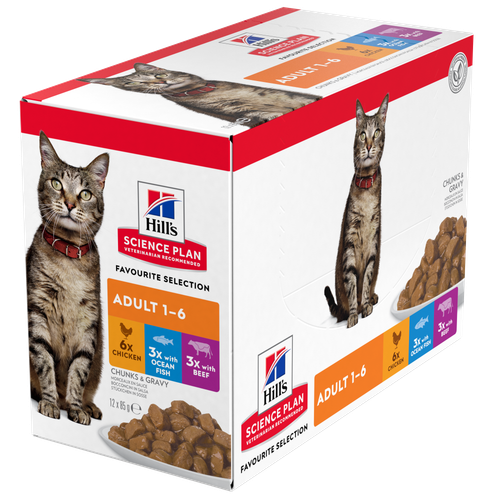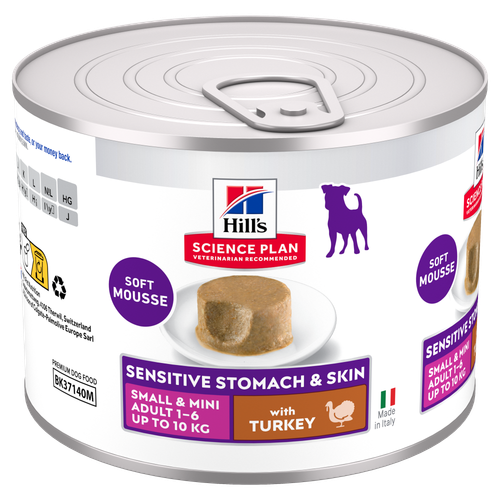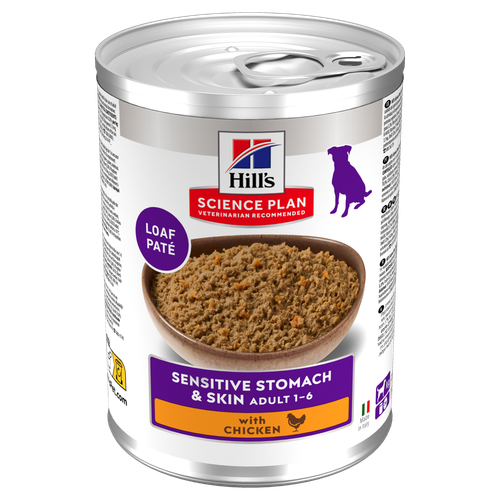
-
Find the right food for your petTake this quiz to see which food may be the best for your furry friend.Find the right food for your petTake this quiz to see which food may be the best for your furry friend.Featured productswith Chicken, with Beef
Hill's Science Plan Puppy Multipack Wet Dog Food with Chicken & Beef are complete premium pet foods for growing puppies from weaning until 1 year old and for pregnant and nursing dogs. Your puppy will love these deliciously smooth and savoury minced loaves, formulated for balanced nutrition and overall health.
Shop Nowwith Chicken, with BeefHill's Science Plan Mature Adult Multipack Wet Dog Food with Chicken & Beef are complete premium pet foods for mature adult dogs from 7 years. Your dog will love these deliciously smooth and savoury minced loaves, formulated to deliver the appropriate amount of energy to support the needs of adult dogs.
Shop NowAdult Dog FoodHill's Science Plan Adult Multipack Wet Dog Food with Chicken, Beef & Turkey are complete premium pet foods for adult dogs from 1 year. Your dog will love these deliciously smooth and savoury minced loaves, formulated for balanced nutrition and overall health.
Shop NowFeatured products with Ocean Fish, Chicken
with Ocean Fish, ChickenTender chicken chunks in gravy for cats, with L-carnitine and fewer calories for ideal weight management. Packed with high-quality protein, omega-6s, and vitamin E for shiny fur and healthy skin.
Shop Now Adult Wet Cat Food with Chicken
Adult Wet Cat Food with ChickenTender chunks in gravy for cats, with high-quality protein to maintain lean muscle. With vitamin E and omega-3s & -6s for healthy skin and balanced minerals to support healthy vital organs.
Shop Now Mature Adult Wet Cat Food with Chicken
Mature Adult Wet Cat Food with Chicken
Tender chicken chunks in gravy for mature adult cats. Made with easy-to-digest ingredients, high-quality protein for lean muscle maintenance and antioxidant vitamins C+E for optimal health.
Shop Now -
Dog
- Dog Tips & Articles
-
Health Category
- Weight
- Food & Environmental Sensitivities
- Urinary
- Digestive
- Joint
- Kidney
-
Life Stage
- Puppy Nutrition
- Adult Nutrition
- Senior Nutrition
Cat- Cat Tips & Articles
-
Health Category
- Weight
- Skin & Food Sensitivities
- Urinary
- Digestive
- Kidney
-
Life Stage
- Kitten Nutrition
- Adult Nutrition
Featured articles The Right Diet For Your Pet
The Right Diet For Your PetIn people, the right diet is very important. If you are eating the wrong way for your metabolism, activity level, age and lifestyle you could end up with health issues.
Read More The Incredible Science Behind Your Pet's Microbiome
The Incredible Science Behind Your Pet's MicrobiomeLearn what your pet's microbiome is, how it contributes to your pet's gut and overall health, and why nutrition is important in maintaining healthy microbiomes.
Read More Show some love with wet foods: a great choice for pets with health issues
Show some love with wet foods: a great choice for pets with health issuesShow some love with wet foods: a great choice for pets with health issues.
Read More -


Given the opportunity, many pets will happily accept (or beg for) human foods like ham and other pork products, especially around holidays like Easter or Christmas. But can dogs (or cats) eat ham? Are these foods safe for your furry friends?
Although pets love to eat ham and other preserved pork items, many veterinarians will advise against feeding them to your dog or cat. Let's take a closer look at pork products and why they may not be the best foods to feed your furry family members.
Why Do Pets Enjoy Ham and Other Pork Products?
Pets love the rich, salty taste of ham, and not just the standard baked ham. While pondering whether or not your dog or cat can eat ham, keep in mind that most pets will happily eat all types of ham, such as honey-baked, smoked or deli-cut. Also, take into consideration other preserved pork foods that may tempt your pet, including hot dogs (a perennial favourite), sausages, brats, bacon, pepperoni, prosciutto and salami.
The two main flavour profiles that make these pork products so appealing to pets (and to you) are what make the food potentially dangerous: salt and fat. "Salty" is one of the four main taste categories that dogs and cats both have (sweet, sour and bitter are the others), but their strong sense of smell also attracts them to rich foods like ham, especially when heated.

It's no surprise that your pet savours the one-two punch of salt and fat in ham, but these ingredients aren't what you'd call "healthy" for your dog or cat and, when ingested in excess, can cause medical issues.
Salts and Fats: Quick Nutrition Facts
Ham and other processed pork products contain a lot of sodium chloride because salt is commonly used to preserve the meat. While some salt is necessary for essential functions and fluid balance in the body, excessive levels are not good for your pet’s health. When consumed in large amounts, sodium chloride can be detrimental to pets with health conditions such as kidney disease or heart disease.
Like salt, fat is also important to your pet's diet; it's a good source of energy and fatty acids. In fact, it is sometimes advised to place pets on high-fat meal plans to aid certain health conditions, support pregnancy, or help underweight pets to gain weight. Keep in mind that this should only be done under the supervision of your veterinarian, and that the high-fat food must be part of a balanced nutritional plan.
Has Your Pet Had Too Much Pork?
Similar to salt, too much fat can result in health problems for dogs and cats. Dogs who eat high-fat foods, for example, can develop pancreatitis (inflammation of the pancreas). Excessive fat intake can also contribute to obesity in pets, a problem that the Pet Food Manufacturers’ Association (PFMA) warns is on the rise. They point out that obesity is commonly associated with other health conditions in pets, like arthritis, diabetes, gastrointestinal problems and liver problems.


Tasty Tips
Young pets may need several visits in their first year for vaccinations. Adult pets generally benefit from annual check-ups, while senior or special-needs pets might require more frequent visits.
Are Raw Pork Products Safe?
Most shop-bought ham products come preserved, but some ham is sold as "fresh," meaning it’s not cooked. So, are uncooked ham and pork products, like bacon and pork roasts, a healthier option? Feeding pets raw pork products is potentially very dangerous, because it can be source of the Aujeszky's virus, which may cause fatal disease in dogs and cats.

Besides this, one of the most common risks associated with feeding raw meats is bacterial infection (such as E. coli and Salmonella). "Even with proper food preparation and handling of stools, the risk of bacterial contamination and infection of both pets and humans in the household is a real risk," explains the World Small Animal Veterinary Association. Not only does this potentially put your pet's health at risk, but it can potentially put your family's health at risk too. Additional dangers can include parasitic and protozoal infections, many of which can be life threatening. There is also the risk of nutritional deficiencies if meals are not properly balanced. So, in short, if you're considering feeding any meat to your pet (ham or otherwise), never feed them raw animal protein sources. It’s just not worth the risk.
Is It Safe to Give My Pet Medication Using Ham?
Ham and other pork products should only ever be fed to your dog or cat on the advice of your veterinarian. Hiding a pill in deli ham to help your cat or dog swallow it may be okay in some instances, as long as you only use small quantities. However, your veterinarian should still assess your dog or cat's particular situation before you do so to ensure that even small amounts of ham do not pose a risk to your pet's health.
What Are Healthy Alternatives to Pork?
It's always best to choose healthy, properly balanced dog and cat foods to feed your pet and use dog or cat treats as the occasional reward. While there are a number of foods that can be healthy "treats" (such as certain fruits and vegetables), making sure your pet gets the right amount of nutrients and calories each day is most important for keeping them happy and healthy. That’s why a proper commercial pet food is recommended. If you're still set on offering your pet some human food as an occasional treat, speak to your veterinarian first. They can provide you with a couple of healthy alternatives that won't unbalance your pet's diet or cause concern for their health.
It may be difficult to deny your fur baby some ham from your plate or a hot dog from the barbeque, but it's the right thing to do for their health. It’s best to keep them on a consistent meal plan with properly balanced dog or cat food. "Extra" food from the table has its own inherent risks in terms of whether or not pets can properly digest it, but it also adds calories to their daily intake. Those extra calories can lead to weight gain, and becoming overweight comes with its own potential host of health problems. So, while you may be tempted to "treat" your dog or cat with some ham or another pork product, it's best to stick to healthy, balanced pet food and treats specially formulated for your dog or cat.


Christine O'Brien is a writer, mom, and long-time cat parent whose two Russian Blues rule the house. Her work also appears in Care.com, What to Expect, and Fit Pregnancy, where she writes about pets, pregnancy, and family life. Find and follow her on Instagram and Twitter @brovelliobrien.
Related products

Hill's Science Plan Perfect Digestion Small & Mini Adult Dog Food with Turkey is a complete premium pet food for small breed adult dogs aged 1–6 years. This deliciously smooth mousse is precisely balanced to deliver the appropriate amount of energy and to support digestive health in adult, small breed dogs.

Hill's Science Plan Adult Small & Mini Dog Food with Turkey is a complete premium pet food for adult small dogs from 1 year old that are prone to weight gain or slightly overweight. This deliciously smooth mousse is formulated to deliver the appropriate amount of energy to support weight maintenance in adult dogs.

Hill's Science Plan Sensitive Stomach and Skin Small & Mini Adult Dog Food with Turkey is a complete premium pet food for small breed adult dogs aged 1–6 years. This deliciously soft mousse is enriched with ingredients that support digestive health & skin care.

Hill's Science Plan Sensitive Stomach & Skin Adult Wet Dog Food with Chicken is a complete premium dog food for adult dogs from 1 year. This savoury tinned loaf is enriched with ingredients that support digestive health & skin care.
Related articles

In people, the right diet is very important. If you are eating the wrong way for your metabolism, activity level, age and lifestyle you could end up with health issues.

Show some love with wet foods: a great choice for pets with health issues.

To make a protein, amino acids are linked together in a long chain. The chain is then bundled into to a three-dimensional structure, like a tangled ball of yarn.

Learn what your pet's microbiome is, how it contributes to your pet's gut and overall health, and why nutrition is important in maintaining healthy microbiomes.

Put your pet on a diet without them knowing
Our low calorie formula helps you control your pet's weight. It's packed with high-quality protein for building lean muscles, and made with purposeful ingredients for a flavourful, nutritious meal. Clinically proven antioxidants, Vitamin C+E, help promote a healthy immune system.
Put your pet on a diet without them knowing
Our low calorie formula helps you control your pet's weight. It's packed with high-quality protein for building lean muscles, and made with purposeful ingredients for a flavourful, nutritious meal. Clinically proven antioxidants, Vitamin C+E, help promote a healthy immune system.

